Technical Delegation In Tehran To Discuss Reopening Of Embassy: Saudi Media
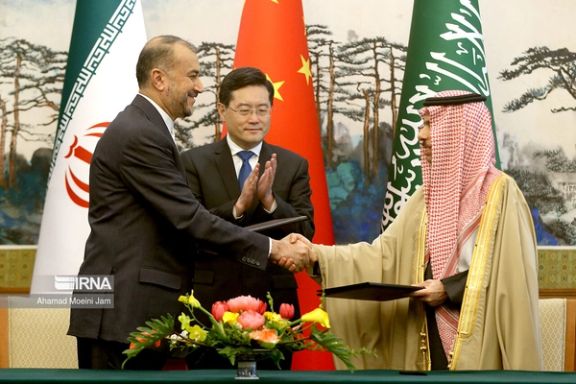
Saudi news media say officials have arrived in Iran to discuss procedures for reopening Riyadh's embassy in Tehran and consulate in Mashhad.

Saudi news media say officials have arrived in Iran to discuss procedures for reopening Riyadh's embassy in Tehran and consulate in Mashhad.
Saudi Press Agency (SPA) reported that a technical team tasked with discussing mechanisms for reopening the Kingdom’s embassy in the Islamic Republic of Iran arrived in capital Tehran Saturday.
“The Saudi technical team, headed by Nasser bin Awad Al-Ghannoum, met with the Chief of Protocols at the Iranian Ministry of Foreign Affairs, Mehdi Honardoust,” added SPA.
This is the first visit of a Saudi delegation to Iran after China brokered a deal to restore relations between the two regional powers. Relations were severed in January 2016 following attacks by Iranian mobs on Saudi diplomatic missions.
However, Iran’s foreign ministry has not yet published any news about the visit at the time of writing this report.
On Thursday, the foreign ministers of Iran and Saudi Arabia met in Beijing for the first formal meeting in more than seven years.
After years of hostility that fueled conflicts across the Middle East, Iran and Saudi Arabia agreed to end their diplomatic rift and reopen their diplomatic missions in March.
Chinese President Xi Jinping helped broker the surprise deal which left the United States on the sidelines.
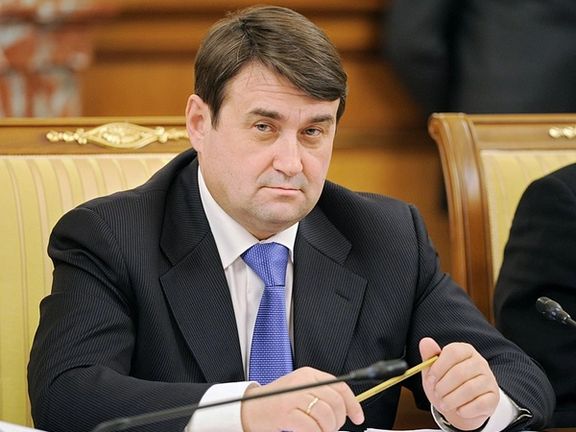
Iranian media report that the special assistant of the Russian president will hold talks with Iran's national security chief Ali Shamkhani on Sunday.
According to IRNA state news agency, Igor Levitin, who arrived in Tehran Friday night, will meet secretary of Iran's Supreme National Security Council on Sunday.
During Levitin's visit to Iran last January, the two countries agreed that the remaining part of the North-South strategic corridor, in Iran’s northern Rasht-Astara route, will be built with the direct investment of Russia.
IRNA, also added that the two sides will review the process of implementing joint economic projects, especially speeding up the implementation of the North-South Corridor.
Meanwhile, Russia’s Sputnik reported that Levitin was scheduled to meet with First Vice President Mohammad Mokhber and Minister of Roads and Urban Development, Mehrdad Bazrpash on Saturday.
The International North-South Transport Corridor (INSTC) is a 7,200-km-long multi-mode network of ship, rail, and road route for moving freight between India, Iran, Azerbaijan, Russia, Central Asia and Europe.
The objective of the corridor is to increase trade connectivity between major cities such as Mumbai, Moscow, Tehran, Baku, Bandar Abbas, Astrakhan, etc.
Russia, Iran and India signed the agreement for the NSTC project in 2002. All three countries are founding member states on the project. Other important member states include Azerbaijan, Armenia, Kazakhstan and Belarus with other states having varying levels of involvement.
Iran started construction work to complete the missing link of the Qazvin-Rasht-Astara road and railway in 2017.

The UN special rapporteur on Iran has expressed solidarity with the Iranian hunger striker who has camped outside the British Foreign Office for 44 days.
Javaid Rehman, the UN human rights rapporteur, Friday visited Vahid Beheshti who has been campaigning for the UK to proscribe the Islamic Revolutionary Guard Corps.
Beheshti has been battling the bitter winter outside the UK Foreign Office to raise awareness for the need to designate the IRGC responsible for the deaths of hundreds of Iranian citizens since September.
In his third letter on Monday the British prime minister, he reiterated his desire to meet PM Rishi Sunak, adding that “my body grows ever weaker, yet internally, I grow ever stronger in my conviction that this is the right thing to do.”
Beheshti called his request to the British government "simple and at the same time, very important" emphasizing the urgency of proscribing the IRGC.
He said the designation urgently needs to happen, not only for the people of Iran who yearn for democracy, but also for the people of Britain and "the values we uphold".
“As long as we continue with our appeasement policy, the IRGC will continue with their hostage taking policies,” he said. “They only understand one language, pressure and strong leadership.”
Beheshti has not eaten since February 23 and lost a large amount of his body mass. In the past days, a group of other Iranians also joined him and set up tents next to him.
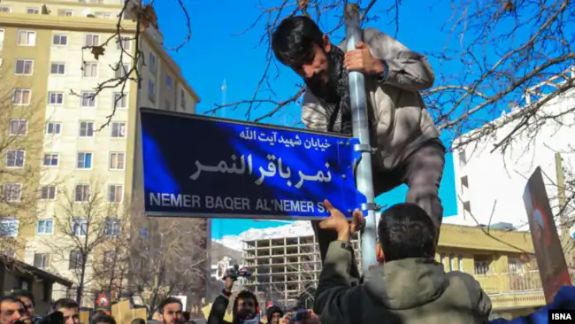
Reports say a street sign in Iran’s religious city of Mashhad that was named in honor of a Shia cleric executed in Saudi Arabia has been removed.
A journalist reported Saturday that there is no trace of the signpost of the street on which the vacant Saudi Consulate is located. The street was named in honor of Nimr Baqir al-Nimr, a Shia cleric and critic of Saudi government, who was beheaded in 2016.
The move came after a Saudi delegation arrived in Iran on Saturday to discuss the re-opening of embassies.
After his death, pro-regime crowds attacked Saudi Arabia's embassy in Tehran and also its consulate in Mashhad, throwing stones and Molotov cocktails, chanting "death to Al Saud". The move led to Riyadh severing diplomatic relations with Tehran for seven years.
However, it seems the name of "Ayatollah Nimr" has been pulled down following the agreement between Tehran and Riyadh concluded in Beijing in March to reopen embassies.
On January 2, 2016, Saudi Arabia’s Ministry of Interior announced in an official statement that Sheikh Nimr Baqir al-Nimr was executed along with 46 other people for terrorism charges and his connection with terrorist groups, mainly Al-Qaeda.
Nimr, who was one of the leaders of the Shiite protests in Saudi Arabia in 2011, had studied in Iran’s religious city of Qom.
Supreme Leader Ali Khamenei called the execution of Nimr "a political mistake and a great sin".
Following his comments, the Mashhad city council approved a plan to name a street in honor of Sheikh Nimr.
Tehran City Council also named a street in District 1 "Sheikh Nimr Baqir al-Nimr" in September 2016.
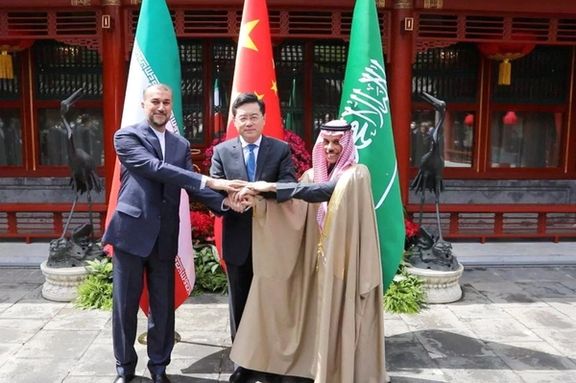
Iran’s government-controlled media is speculating about the direct economic benefits of restoring relations with Saudi Arabia, amid a deep economic crisis.
Although it is not clear how far the Saudis are willing to go in developing ties with Iran, the hard-pressed government in Tehran is encouraging expectations of a big windfall.
The government’s official news website IRNA Saturday carried a lead article titled, “Expansion of trade relations with Saudi Arabia, an important leap for Iran’s economy.” There were also similar opinions in other websites.
IRNA’s article carried no concrete information about when and how economic relations will expand with Riyadh, while Tehran is under US sanctions. IRNA, in fact, presented a wish-list.
Meanwhile, Saudi officials arrived in Iran to discuss procedures for reopening Riyadh's embassy in Tehran and consulate in Mashhad, the Saudi foreign ministry said on Saturday.
The only concrete hope Tehran can have is easing financial and commercial restrictions by the United Arab Emirates, close ally of Saudi Arabia, for potential Iranian attempts to circumvent US banking sanctions. Washington will be certainly watching the situation, but any Saudi acquiescence in helping Tehran indirectly break sanctions could be a blow to the United States pressure policy on the Islamic Republic.
CIA Director William Burns visited Saudi Arabia this week to reaffirm intelligence cooperation, a US official said on Thursday, as the kingdom on the same day Iranian and Saudi top diplomats met in Beijing to start the process of re-establishing diplomatic ties.
China's role in arranging the deal was seen by some experts as signaling a decrease in US influence with Saudi Arabia amid tensions between Washington and Riyadh over a number of issues, including human rights and Saudi oil production cuts.
"Director Burns traveled to Saudi Arabia, where he met with intelligence counterparts and country leaders on issues of shared interests," the U.S. official said on condition of anonymity.
If not on the economic front, the Saudi-Iranian rapprochement is already giving diplomatic and security dividends, at least in reducing tensions in Yemen.
Saudi and Omani envoys are planning to visit Yemen's capital Sanaa next week to negotiate a permanent ceasefire deal with Iran-aligned Houthi officials, according to Reuters, and end an eight-year-old conflict there, two people involved in the talks said.
Oman, which shares borders with Yemen and good relations with both Riyadh and Tehran, has been trying for years to bridge differences between Yemen's warring parties, and more broadly between Iran and Saudi Arabia and the United States. A permanent ceasefire in Yemen would mark a milestone in stabilizing the Middle East.
If an agreement is reached, the parties could announce it before Islam's Eid holiday starting April 20, the sources said.
Right before news of a possible peace visit to Sanaa by Saudi and Omani representatives, the Saudi led military coalition lifted eight-year-old restrictions on imports headed for Yemen's southern ports, the internationally recognized authorities said, in a sign that peace talks are progressing with the Houthi group in the north.
This follows the easing of restrictions in February on commercial goods entering the Houthi-held western port of Hodeidah, the country's main seaport, as Yemen's warring sides work to reinstate an expired UN-brokered truce deal.
The Saudi-backed government based in the south said in a statement late on Thursday that commercial ships would be allowed to dock directly in southern ports, including Aden, and all goods would be cleared, with some exceptions.
Abu Bakr Adeed, deputy head of Yemen's Chambers of Commerce, told Reuters ships would not have to stop at the Saudi Red Sea port of Jeddah for security checks for the first time since the Saudi-led coalition intervened in Yemen in 2015.
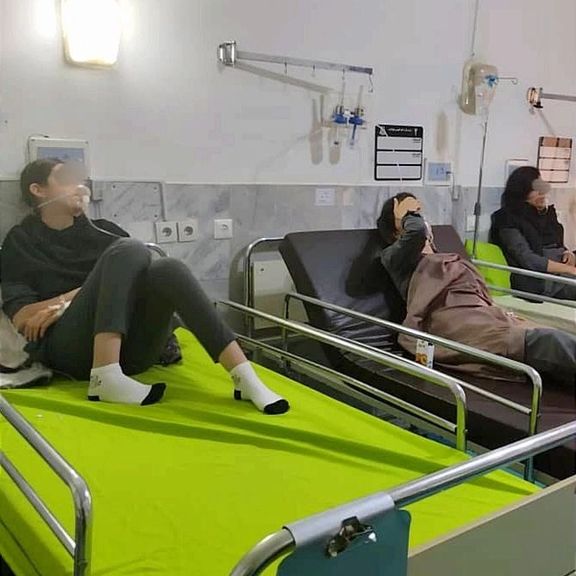
Human Right organizations report that suspected gas poisoning in Iran’s schools continued on Saturday with with 12 schools targeted and several schoolgirls hospitalized.
The Twitter account of Hengaw, which is an Independent rights monitoring group following violations in Iran’s Kurdish regions, reported that two schools in the city of Naqadeh were attacked on Saturday.
Meanwhile, The Coordination Council of Iranian Teachers' Trade Associations reported a school in the city of Ardabil in the northwest was also attacked and a number of students were poisoned.
There are also reports of an attack with suspected poisonous gas on a school in Haftkal city of southern Khuzestan province. At least 20 students with symptoms of gas poisoning have been admitted to the hospitals of the city.
At least 130 elementary and high schools were targeted in the past Iranian year ending in March 20.
The attacks that started in November have continued without any apparent effort by the government to seriously pursue the perpetrators or explain to terrified parents and students what was happening in so many schools.
Many ordinary Iranians have been suspicious of involvement of the regime itself, or religious extremists protected by the regime, calling the attacks “state terrorism”.
The government has aired ‘confessions’ of those allegedly responsible for the attacks as a man and his daughter forced to speak to national TV. The broadcast has all the trademarks of the regime’s forced confessions.
Local media has been asking the government about its total silence on any ongoing investigation.